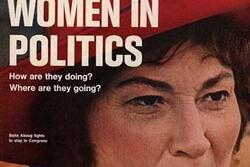Nasty Women, Unite!
When Donald Trump muttered the word “nasty” into his microphone at the third presidential debate, all I could think of was a quote by Bella Abzug. Presciently, while advocating for women in the 1970s, the New York senator said, “The Establishment is made up of little men, very frightened.” Trump’s choice to use the word “nasty” in an attempt to silence someone who disagrees with him reads as the definition of a little man to me, and Trump is a little man who is very frightened.
This isn’t the first time a man has tried to quiet and dismiss powerful women with the word ‘nasty.’ In Megan Garber’s article, “Nasty: A Feminist History,” Garber writes that Shakespeare’s Hamlet “used the word to combine sex with that infamously dirty animal, the pig: “Nay, but to live/ In the rank sweat of an enseamèd bed,/ Stewed in corruption, honeying and making love/ Over the nasty sty.” Harvard historian Caroline Light notes that, “A ‘nasty’ woman is one who refuses to remain in her proper place, as defined by men. One who challenges male authority.” Little men have used labels like “nasty” (naggy, ridiculous, ugly, angry) to belittle and disempower women for centuries, and because few women have been given the resources and platform to publicly respond to these labels, nasty women have been either silenced or been caricatured in historical narratives.
In many ways, the misogynist rhetoric that has filled this election cycle feels more like a step backward than a step forward. Can we possibly read Trump’s grasping utterance as a sign of progress? What happens when the little men who run “the Establishment” run out of effective ways to silence opinionated women?
If we widen our point of view, we see that historically, progress is messy; we move forward and are then pushed back, we get one right (like the right to vote) and then have to fight tooth and nail for the next one (like the right to access to birth control). In the sixties and seventies, we saw the largest expansion of civil rights that our country has ever seen. In the eighties, we saw huge anti-gay movements, an increase in incarceration, and a conservative backlash that has weakened civil rights and progressive political infrastructure for decades. Trump resorting to calling one of the most powerful women in our country “nasty” gives me hope that we have another––better––era of progress ahead of us.
Has the sexism in this election cycle been horrifying and disheartening? Yes. But it has also started dialogues about women’s lives that span across countries, generations, and platforms. No one can argue that Hillary’s femaleness has not directly affected how she is perceived and criticized by her political opponents. Today more and more women are empowered through technology and the mainstreaming of feminist thought to dissent and articulate themselves and their experiences when little men seek to deride, degrade, and dismiss them.
We have examples of this progress across the world. In Russia last week, the political punk group Pussy Riot released their newest single “Straight Outta Vagina” with an accompanying (awesome) music video. While this release is perfectly timed to coincide with Trump’s recent audio leaks, Tolokonnikova, a member of the feminist musical collective, pointed out that “the idea of powerful female sexuality is much bigger than any populist megalomaniac man…Vagina is bigger than Trump.” In the United States, Trump’s remarks have galvanized protests outside Trump Tower in New York. Women and men held signs last week that read “November 8th, the Pussy Grabs Back” and “Grope + Brag = A Weak Man.” Protests are also taking place on the internet, with #GOPHandsOffMe and #NastyWoman serving as cyber rallying cries.
These women from around the world, and their different forms of activism, serve as a reminder that it takes a million actions to create change, but change is definitely possible. Hillary may have been alone on the debate stage with Trump when he tried to diminish her, but she is not alone; there are legions of equally nasty (read: uncontrollable and unapologetic) women who have helped make space for women at the table. Are you excited? For the first time ever, we get the chance to vote for a woman president. We are not only watching history being made––we are making it!
And, for the record, as a nasty woman, Hillary is in good historical company. Emma Goldman was a nasty woman, and Rose Schneiderman was a nasty woman. Bella Abzug was a nasty woman. Gloria Steinem and Ruth Bader Ginsberg are nasty women. If history is any indicator, nasty women change the world.







